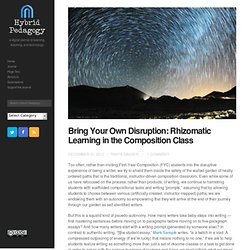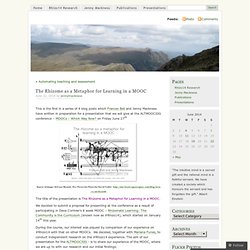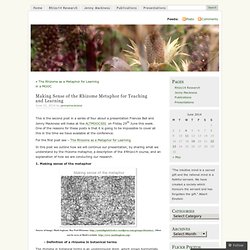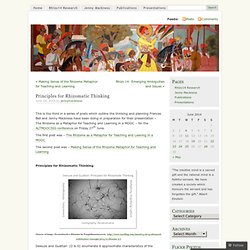

McIntyre - Exploring a Rhizomic Model. Bring Your Own Disruption: Rhizomatic Learning in the Composition Class. Too often, rather than inviting First-Year Composition (FYC) students into the disruptive experience of being a writer, we try to shield them inside the safety of the walled garden of neatly ordered paths that is the traditional, instructor-driven composition classroom.

Even while some of us have refocused on the process, rather than products, of writing, we continue to hamstring students with scaffolded compositional tasks and writing “prompts,” assuming that by allowing students to choose between various (artificially-created, instructor-mapped) paths, we are endowing them with an autonomy so empowering that they will arrive at the end of their journey through our garden as self-identified writers. But this is a squalid kind of psuedo-autonomy. How many writers take baby-steps into writing — first mastering sentences before moving on to paragraphs before moving on to five-paragraph essays?
And how many writers start with a writing prompt (generated by someone else)? The Rhizome as a Metaphor for Learning in a MOOC. June 22, 2014 by jennymackness This is the first in a series of 4 blog posts which Frances Bell and Jenny Mackness have written in preparation for a presentation that we will give at the ALTMOOCSIG conference – MOOCs – Which Way Now?

On Friday June 27th Source of image: Sylvano Bussoti. Five Pieces for Piano for David Tudor: The title of the presentation is The Rhizome as a Metaphor for Learning in a MOOC. We decided to submit a proposal for presenting at the conference as a result of participating in Dave Cormier’s 6 week MOOC – Rhizomatic Learning: The Community is the Curriculum (known now as #Rhizo14), which started on January 14th this year. During the course, our interest was piqued by comparison of our experience on #Rhizo14 with that on other MOOCs. It has been difficult to plan both the research and this presentation. So we have given some thought as to how to do a presentation which reflects these difficulties. Some questions that have emerged are: Making Sense of the Rhizome Metaphor for Teaching and Learning.
This is the second post in a series of four about a presentation Frances Bell and Jenny Mackness will make at the ALTMOOCSIG on Friday 29th June this week.

One of the reasons for these posts is that it is going to be impossible to cover all this in the time we have available at the conference. For the first post see – The Rhizome as a Metaphor for Learning In this post we outline how we will continue our presentation, by sharing what we understand by the rhizome metaphor, a description of the #Rhizo14 course, and an explanation of how we are conducting our research. 1. Making sense of the metaphor Source of image: Mark Ingham. . - Definition of a rhizome in botanical terms The rhizome in botanical terms is an underground stem, which grows horizontally along or more commonly under the ground and sends out roots and shoots.
Principles for Rhizomatic Thinking. This is the third in a series of posts which outline the thinking and planning Frances Bell and Jenny Mackness have been doing in preparation for their presentation – The Rhizome as a Metaphor for Teaching and Learning in a MOOC – for the ALTMOOCSIG conference on Friday 27th June.

The first post was – The Rhizome as a Metaphor for Teaching and Leaning in a MOOC The second post was – Making Sense of the Rhizome Metaphor for Teaching and Learning Principles for Rhizomatic Thinking (Source of image: Deconstructive Rhizome by Pongtidasantayanon: Deleuze and Guattari (D & G) enumerate 6 approximate characteristics of the rhizome. So for now we’ll stick with the six principle characteristics, which are on the image above and listed below. In Week 2 of Rhizo14 a discussion arose in the Facebook Group around some participants’ perception that they were expected to study theory, and that some other participants’ posts were condescending. Big health warning here – these findings/thoughts are tentative. JENKINS_WHITE_PAPER.PDF. “There’s no fixed course”: Rhizomatic learning communities in adolescent videogaming. Rhizomatic learning.